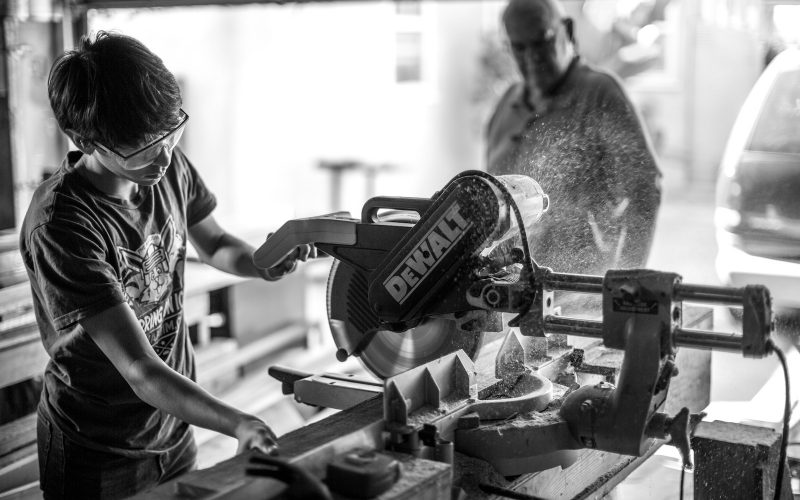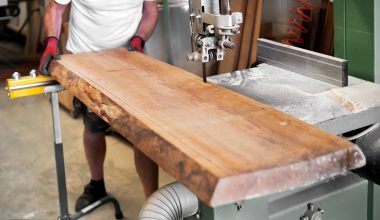For those proficient in the carpentry and woodworking industry, chop saws are commonplace. If you are a beginner, then you may be quite confused as to what a chop saw is used for and how to use it.
The overall function of a chop saw is to efficiently and accurately crosscut materials in a safe and precise way. However, there is more to this tool than may be obvious at first glance.
What Is A Chop Saw?
A chop saw, sometimes also known as a miter saw, is electric motor-powered. It consists of a sharp circular blade which rotates 360 degrees at high speeds. This blade is able to cut through materials such as metal and wood. The material is clamped to the base plate, and the circular blade is lowered down to cut. This is controlled with a lever or handle by the craftsperson.
The handle makes it safer for a person to handle it. It can be stopped very quickly when releasing the trigger mechanism built into the handle. However, it is still wise to maintain all safety precautions. We always recommend wearing safety equipment such as gloves and protective eyewear to prevent any harmful injuries. Also, make sure that everything is functioning well on the tool and inspect the blade to see if it is intact and not broken.
Variations in Design
Chop saws can have various functions depending on the type that you choose and your requirements of the material that is being cut.
There are four main types of chop saw:
- Standard Chop Saw
- Compound Chop Saw, (commonly referred to as a Miter Saw).
- Sliding compound
- Dual compound
Each of these is quite similar in terms of having a similar circular saw blade that moves down the material to cut. However, they each have slight variations that set them apart, such as size, functionality, and weight.
A standard chop saw is quite limited as it only cuts down in one plane. This means so it can’t be used for any angle or bevel cuts. This is the most common type for cutting metal pipes and other metals objects.
Whereas, the compound variation is often more versatile for the hobby level craftsman. It cuts straight crosscuts and also angled cuts at various degrees. Being compound makes bevel cuts possible whilst still keeping a small and portable sized tool.
Other types are dual-compound chop saws that allow the blade to tilt directions. This is so that slanted cuts can be made in either direction without moving the material. Sliding-compound saws allow cuts through the thickest types of wood as it has the ability to cut back and forth.
There is also another variety, called an abrasive saw. This is usually used to cut harder materials that offer more resistance to pressure such as metals or concrete. It uses a different type of saw blade and motor to provide even greater power.
Overall, the type of tool you require depends on your individual needs and the budget you have available.
Types of cut
The main ways to cut wood are cross-cutting or rip cutting. Cross-cutting refers to cutting the wood perpendicular to the grain of the wood and rip cutting is when the wood is cut parallel to the wood grain respectively. However, a chop saw can only crosscut and is perfect for this use as it is used commonly during a DIY project or building work.
Chop Saw history
Chop saws have been around since the 1970s and the first version was made out of a box with angled slits so that a hand-held saw could be used to make cuts. Around 1964, Ed Niehaus created the first-ever miter saw which combined a blade with a sliding element so that longer cuts can be made in wood. This has been the blueprint for the development of the chop saw.
Overall, when deciding the best one, a chop saw is the most suitable type for DIY projects as it is relatively affordable and can withstand multiple projects whilst making the job easier.






